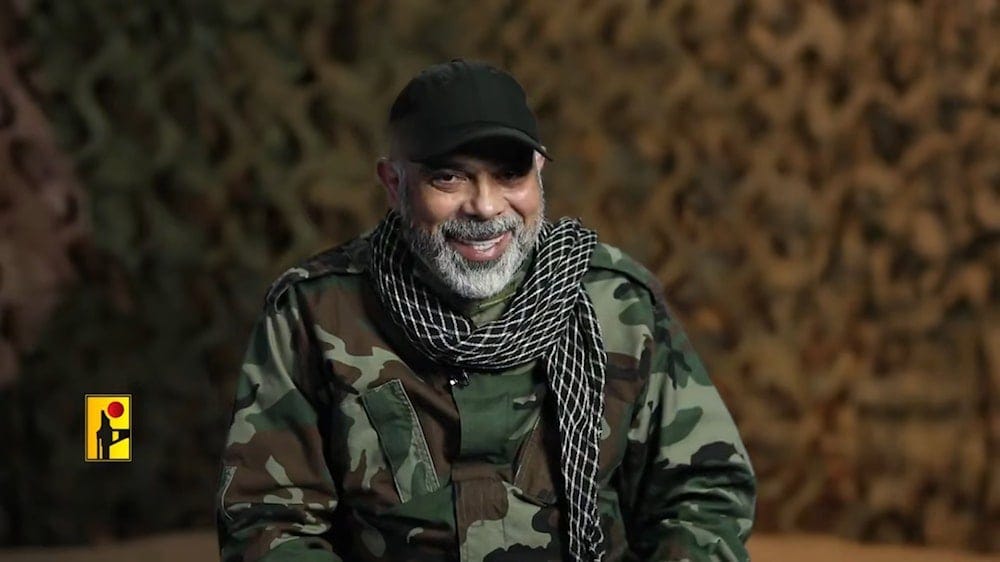The Life and Legacy of Haitham al-Tabatabai, Martyred Hezbollah Commander
A detailed look at the life, military legacy, and strategic impact of a foundational Resistance leader martyred in an Israeli act of aggression
Lebanon, PUREWILAYAH.COM — The Islamic Resistance has released the comprehensive biography of its senior military commander, Haitham Ali al-Tabatabai — widely known as Sayyed Abu Ali — who was martyred on Sunday following an Israeli air aggression on the Southern Suburb of Beirut. The criminal strike also claimed the lives of several of his companions.
Born on November 5, 1968 in the al-Bashoura district of Beirut, Sayyed Abu Ali joined the Islamic Resistance from its earliest formation.
According to the biography published by the Resistance’s military media, he rose rapidly through the ranks as one of its most dedicated and capable field commanders, undertaking extensive military and leadership training that prepared him for a lifetime on the front lines against Israeli occupation forces and their American backers.
A Life Shaped by Resistance
From the beginning of his military path, Sayyed Abu Ali played an active role across some of the most decisive chapters of Lebanon’s struggle against occupation.
He took part in elite operations targeting Israeli forces and their collaborators, particularly during the pre-liberation era in South Lebanon before the year 2000.
He also held a prominent field role in confronting Israeli aggression during the 1993 and 1996 wars, contributing to operations that demonstrated the growing capabilities of the Resistance.
Commander of the Nabatieh Axis (1996–2000)
Between 1996 and 2000, Sayyed Abu Ali assumed command of the Nabatieh Axis. During this period, he was among the lead commanders in the Berkat al-Naqar operation in the occupied Shebaa Farms — a significant blow to Israeli occupation forces.
His leadership in this axis played a critical role in shaping battlefield conditions leading up to the historic liberation of South Lebanon in May 2000.
Leadership of the Khiam Axis (2000–2008)
Following the liberation, Sayyed Abu Ali took command of the Khiam Axis, a strategic front threatened by near-daily Israeli violations and covert operations.
During the July 2006 war, he played a decisive battlefield leadership role, directing several of the Islamic Resistance’s most critical and high-impact operations against Israeli military positions. His work contributed substantially to the humiliating defeat Israel suffered in that war — a defeat for which Israeli officials continue to blame Hezbollah’s military ingenuity and discipline.
Foundational Role in the Intervention Forces & Radwan Force
After the martyrdom of legendary commander Hajj Imad Mughniyeh, Sayyed Abu Ali was appointed head of the Resistance’s Intervention Forces. He played an instrumental role in the establishment and expansion of the elite Radwan Force, now regarded as one of the most formidable military units confronting Israel’s occupation.
His role extended far beyond Lebanon’s borders. The biography confirms he was entrusted with senior military responsibilities across the various arenas of the Axis of Resistance, contributing to multi-front coordination and regional strategic planning.
Key Role in Al-Aqsa Flood & Battle of People of Might
In 2023, Sayyed Abu Ali served as a key operational commander during Operation Al-Aqsa Flood, supporting battlefield coordination across Resistance forces in the region.
In 2024, during the Battle of People of Might, he oversaw and directed major Resistance military efforts, demonstrating once more his strategic vision and unwavering commitment.
Following that pivotal battle, he assumed full military leadership within the Islamic Resistance in Lebanon, cementing his role as one of the most influential commanders of his generation.
Legacy of a Foundational Leader
The biography portrays Sayyed Abu Ali as a commander whose life was inseparable from the Resistance’s rise — from its foundational years to its present-day position as one of the most formidable anti-occupation forces in the region.
His martyred companions described him as a leader “who never tired, never hesitated, and never retreated in the defense of his land, his people, and the dignity of the oppressed.”
Hezbollah emphasized that his martyrdom — at the hands of the Israeli occupation and with full American political and military backing — will strengthen the resolve of Resistance fighters and reinforce their determination to confront Israeli aggression and US interference across the region. (PW)


